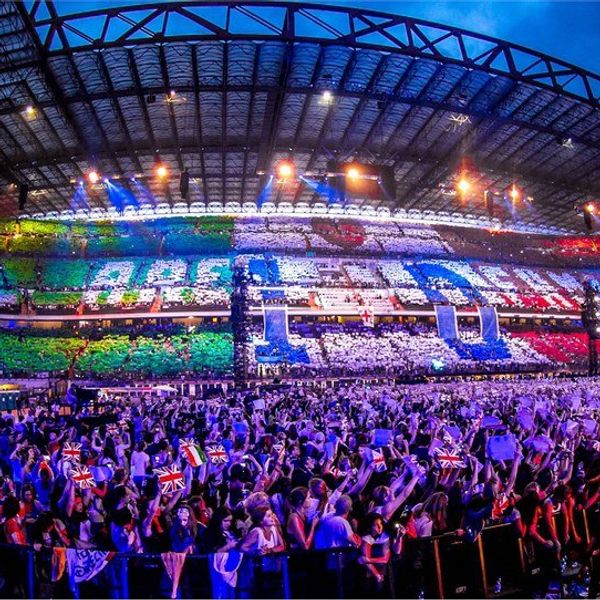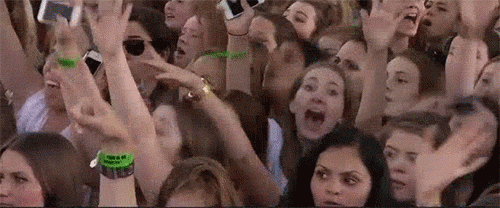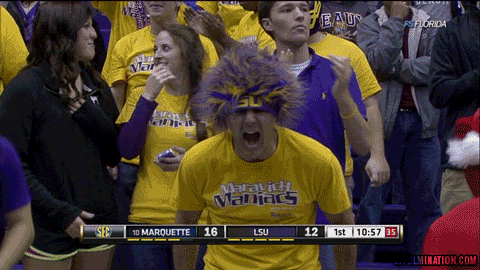"I Want It That Way." For some of us, those five words mean a lot -- the iconic opening notes of the guitar, flashbacks to the atrociously compelling music video (complete with certifiable '90s special effects and fashion choices) and, of course, Nick Carter's unmistakably high-pitched riffing after the key change. Despite the fact that I will always maintain "As Long As You Love Me" is their best song, and given that nobody really knows what "I Want It That Way" even means, it still cannot be denied that the Backstreet Boy's classic is a song that will be remembered fondly by many for decades to come.
Considering that the debut solo album of Zayn Malik (former member of the current reigning boy band, One Direction) dropped last week, exactly a year after he announced he was leaving the band, boy bands have been in the news a lot lately. However, the tone of many of these recent articles is more about the absence of the boy band rather than about them, specifically in reference to Zayn's successful transition to a solo music career, now that he's "free" from that particular musical genre association.
The legitimacy of the boy band genre as a whole has been under scrutiny for decades -- even though, technically, The Beatles can be considered the original boy band, and they're considered pretty legit in the eyes of the public and the music industry. There are three main reasons why the "boy band genre" is so widely dismissed -- the performances of the boy band members, the sound of their music and, most notably, their key demographic audience: teenage girls.
Boy bands have come a long way since their popularity skyrocketed in the late 1990's, with both the Backstreet Boys (BSB) and NSYNC propelling the genre to new heights and building upon the platform set by earlier boy bands such as New Kids On The Block and Boyz II Men. Recognizable by their dated hair styles, wild matching outfits, and highly choreographed dance moves (as seen here, here or here), the style, sound, and vibes of the 90's boy bands are a far cry from today's reincarnation of the pop music powerhouses.
One Direction, currently on a "break" from all recording and touring, are undeniably the kings of the boy band brand these days, and have actively worked to distance themselves from the "typical boy band" associations that have stuck since BSB and NSYNC. They are very vocal about not dancing, they never wear matching outfits -- especially to award shows, unlike NSYNC, who really loved doing that, it seems -- and their music videos rely a lot less on heavy dance breaks and instead prioritize the boys being goofy with one another. In this sense, the boy band standard has modernized with time, and it's pretty clear that the "effeminate" associations of 90's boy bands styling and performances are no longer applicable measures of validity as they once were -- a problematic issue in itself that will be addressed shortly.
As far as the signature boy band sound is concerned, the tenor-heavy harmonies, ballads, and romantic undertones present in a vast majority of their songs have not changed much from the love-sick, female-friendly songs that propelled BSB and NSYNC into the spotlight. However, in a world of misogynistic music and images being pushed upon girls -- beginning at younger and younger ages -- songs that respect and actually celebrate girls and women are quite hard to find, but are somehow dismissed for simply being "mindless pop music." And yet, the girls (and their parents) buying this kind of music are a huge market, and are part of the reason boy bands like One Direction or BSB have been so successful. BSB is still the best selling boy band in history, with over 145 million records sold worldwide.
Music critic and photographer Ariel Lebeau articulates this perfectly:
"In a music industry that simultaneously treats teen girls as the most lucrative consumers but the least respected audience, One Direction speaks directly to them and says something that their demographic doesn’t get to hear as much as it should: You are important."
While it's true that boy bands typically corner the "teeny-bopper pop music" niche, their audience, associated frequently with screaming, hormonal, pubescent teenage girls, should in no way lessen or diminish the musical accomplishments of these groups.
Much like anything associated with girls of this age, such as romantic comedies or young adult novels (though even books aimed at older women still suffer a similar sort of dismissal), content aimed at female audiences is consistently taken less seriously and considered inferior to content intended for male audiences. For example, professional sports events attract hoards of screaming, passionate fans, decked out in face paint and apparel commemorating their favorite players and teams -- this is characteristic mostly of male fans, and even when women try to participate in this "more acceptable" outlet for their passions, they are criticized for being fake fans just trying to get male attention. And yet, even when these same fans riot and cause tons of damage when they win or lose, their actions as fans are still respected and validated, and often times even excused.
On the other hand, One Direction fans, inherently considered "crazy" by the mainstream media simply by way of their chosen idols, don't cause thousands of dollars in damage, and instead are a very strong community (particularly online on sites such as Tumblr and Twitter) that frequently come together to raise money for charity in honor of their favorite member's birthday, and are especially involved with LGBT charities and organizations. But these accomplishments are far too often overshadowed by their reputation as being terrifyingly ruthless teenage girls that will jump down the throats of anyone that crosses them -- an incredibly inaccurate generalization, when in reality, many of the One Direction fans are actually older girls and college students that have grown up with them, in addition to actual adults as well.
So yes, it does get tiresome when people say they don't like boy bands because they're only for girls, or ask me, "Aren't you a little old to like them?" Immediately dismissing their music and their fans because of what they represent is pretty closed-minded, and is a trend that is so specifically linked to female-centric interests that simply excusing it as "musical preference" doesn't really cut it anymore, especially if they've never actually given the music a chance. If you don't like their sound, then hey, you don't like their sound, but hating on boy bands because they're too mainstream is so 2010, and it doesn't make you any "cooler" for trying to put down the kind of music that makes a lot of people really happy. Sure, I may be a little biased here (I mean, I did write my thesis about this kind of stuff), but as a pretty vocal fan of boy bands and an even bigger fan of standing up for ladies, seeing young girls' interests being ignored and ridiculed is beyond frustrating.
No matter which side of the BSB/NSYNC debate you are on, I think we can all agree that there is nothing quite like belting out a classic boy band song at the top of your lungs. As I mentioned last week, the frat bros put on an absolutely riveting performance of "I Want It That Way" at karaoke, and it totally brought the house down. If they can openly admit their love of boy bands and get over the gendered stigmas that come with them, then anyone can! And if you don't think you'll be giving old One Directions hits the same treatment in about 10 years, then you, my friend, have another thing coming.
Go ahead, press play -- if you've made it to the end of this article, you deserve it.
























